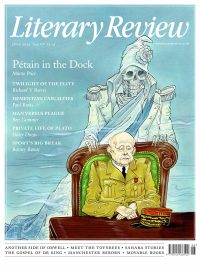Robert Colls
Aristocracy of Labour
An Uneasy Inheritance: My Family and Other Radicals
By Polly Toynbee
Atlantic Books 448pp £22
It’s hard to know what this book is really about. Polly Toynbee or her family? Let’s do it her way and start with the family. She belongs to a family so famous she can research it by reading biographies of her relatives. Her great-great-uncle Arnold Toynbee (1852–83) was the young Oxford don who popularised the phrase ‘Industrial Revolution’. At the same time, he cut a saintly figure in London’s East End, striving for workers’ education, and may be seen as one of the founders of the reformist settlement movement. When he died, aged thirty, from ‘overwork’, Toynbee Hall was founded in Spitalfields in his memory. His brother, Harry Toynbee (1861–1941), Polly’s great-grandfather, was general secretary of the Charity Organisation Society, a body that invented social work. Harry’s son and Polly’s grandfather, another Arnold (1889–1975), was a world-famous historian who appeared on the cover of Time magazine, though nobody quite remembers why. Polly’s great-aunt Jocelyn Toynbee was a professor of archaeology at Cambridge; another great-aunt, Margaret Toynbee, was a fellow in history at St Hugh’s, Oxford. Arnold’s first wife, Rosalind Murray, a poisonous snob according to Polly, was the daughter of Gilbert Murray (1866–1957), Regius Professor of Greek at Oxford, and Lady Mary Howard (1865–1956), daughter of the Earl of Carlisle. Somewhere up the line there was a big castle in Yorkshire.
Arnold and Rosalind had three boys. Philip, the middle one, was Polly’s father. It’s unlikely that he is remembered (in a good way) at the six prep schools that expelled him, or at Rugby School, or at Christ Church, Oxford, which admitted him. On the other hand, he might be remembered by older readers as a prominent Observer journalist. In other circles, he might be remembered for his work on behalf of the Communist Party: he was a drinking pal of Donald Maclean and a colleague of Kim Philby. To be fair, Polly doesn’t know quite what he did for them, and probably neither did he. Polly remembers him as an entertaining drunk not fit to be in charge of a pram.
Anne Powell, Polly’s mother, was the daughter of George Powell (Eton and the Grenadier Guards) and Barbara Pryor (from the Truman’s Brewery family). When Barbara was not pushing her debutante daughter round Parisian dress salons, she was a secret communist (or so she later claimed). Anne’s sister Elizabeth

Sign Up to our newsletter
Receive free articles, highlights from the archive, news, details of prizes, and much more.@Lit_Review
Follow Literary Review on Twitter
Twitter Feed
Alfred, Lord Tennyson is practically a byword for old-fashioned Victorian grandeur, rarely pictured without a cravat and a serious beard.
Seamus Perry tries to picture him as a younger man.
Seamus Perry - Before the Beard
Seamus Perry: Before the Beard - The Boundless Deep: Young Tennyson, Science, and the Crisis of Belief by Richard Holmes
literaryreview.co.uk
Novelist Muriel Spark had a tongue that could produce both sugar and poison. It’s no surprise, then, that her letters make for a brilliant read.
@claire_harman considers some of the most entertaining.
Claire Harman - Fighting Words
Claire Harman: Fighting Words - The Letters of Muriel Spark, Volume 1: 1944-1963 by Dan Gunn
literaryreview.co.uk
Of all the articles I’ve published in recent years, this is *by far* my favourite.
✍️ On childhood, memory, and the sea - for @Lit_Review :
https://literaryreview.co.uk/flotsam-and-jetsam